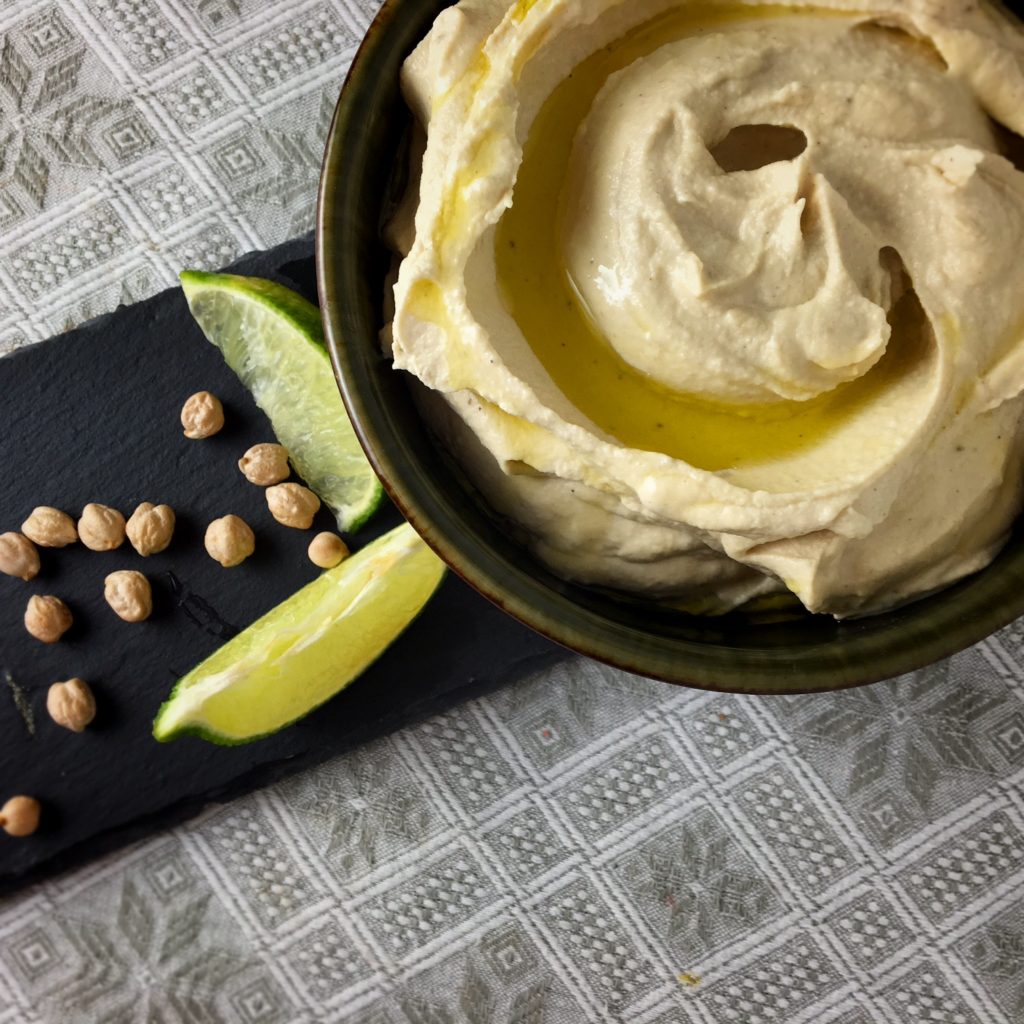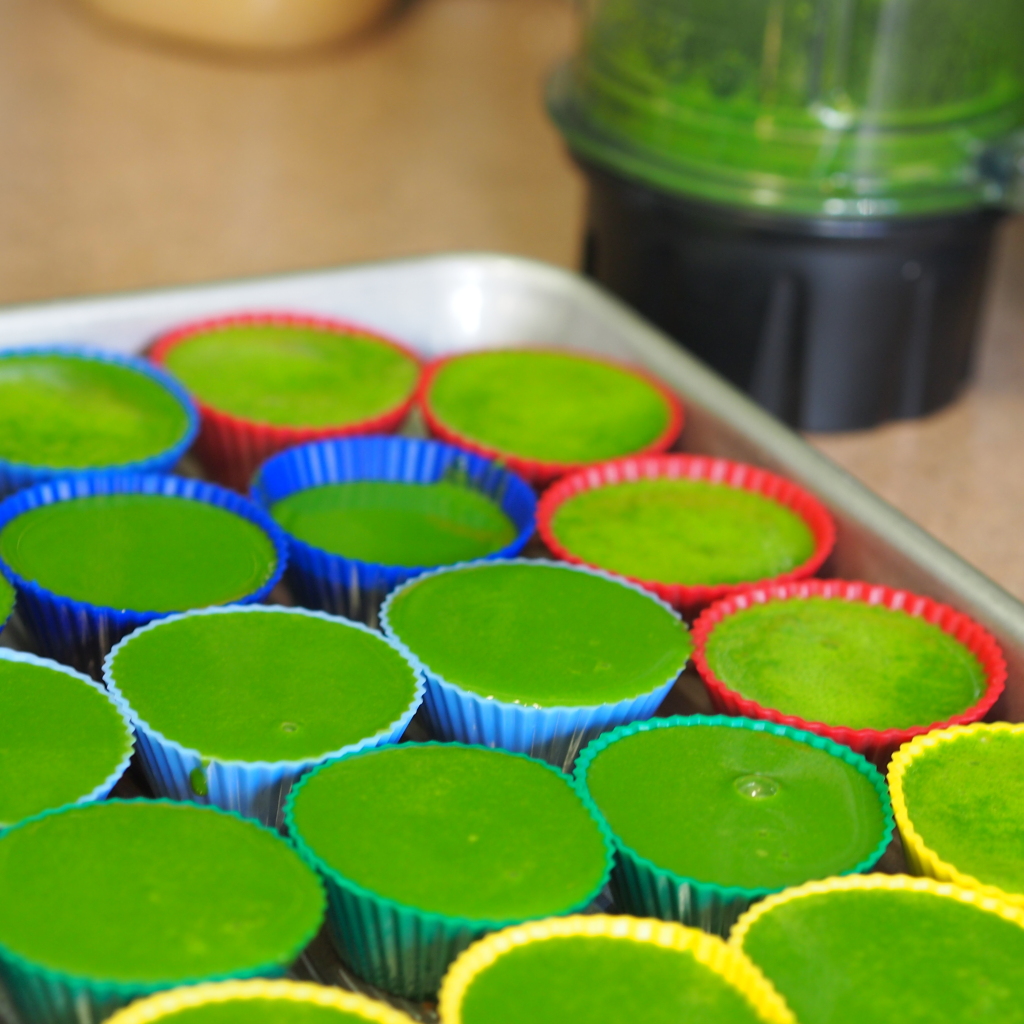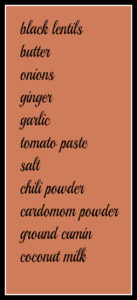 I have a few general ‘food rules’ I try to follow, things I’ve found are pretty much guaranteed to make me feel healthy. One of those rules is to eat legumes in some form every day. I came to rely on legumes first because I found they were so good at helping to keep my blood sugar (and therefore my energy and mood) steady. But I don’t complain that they are also cheap, store easily, take spices and flavors beautifully, and introduce me to cuisines from all over the world.
I have a few general ‘food rules’ I try to follow, things I’ve found are pretty much guaranteed to make me feel healthy. One of those rules is to eat legumes in some form every day. I came to rely on legumes first because I found they were so good at helping to keep my blood sugar (and therefore my energy and mood) steady. But I don’t complain that they are also cheap, store easily, take spices and flavors beautifully, and introduce me to cuisines from all over the world.
I feel well-prepared for any week if it starts with some sort of lentil soup as well as a container of homemade hummus in the fridge.
This recipe is adapted from Meera Sodha’s Made in India. I actually started off making it by the book. I was weirdly proud of myself for pulling out the measuring spoons. Until I realized I wanted more spices (there’s a life motto – more spice!) and I would be swapping the dairy milk for coconut milk anyway. So who am I kidding – Following a recipe is just not for me.

Improvisation aside, this recipe is not about spontaneity. You have to soak the beans, boil the beans, and simmer the dal. Plan to start the actual cooking 2 1/2 hours or so before you want to eat, though most of the time is unattended. Or do as I often do with long-simmering dishes. Get the pot on the stove, make something else for dinner, and by the time you’ve eaten and cleaned up, tomorrow night’s dinner* will be finished. Love cooking or not, most of us just don’t have time to do it every night!
Black Lentil Dal
4 servings
7 ounces urad dal(black lentils)
4 tablespoons butter, divided
1 onion, diced
1 inch piece of ginger, finely chopped
5 cloves of garlic, crushed
3 tablespoons of tomato paste
1 teaspoon salt
3/4 teaspoon chili powder
1/2 teaspoon cardamom powder
1/2 teaspoon ground cumin seeds
3/4 cup coconut milk
The night before you are to make the dish, soak the lentils. Rinse the lentils well and place in a large bowl. Cover with water and soak overnight or up to 24 hours.
Rinse and drain the soaked lentils and put in deep pan. Cover with water and bring to a boil. Leave at a low boil for 45 minutes, skimming the water as necessary.
While the lentils are boiling, put 3 tablespoons butter in a skillet over medium heat. When the butter begins to foam, add the diced onions. Cook them slowly for 15 minutes. Add the ginger and garlic. Cook a further 5 minutes or longer, being careful not to burn. Add the tomato paste, salt, chili powder, cardamom, and cumin. Stir and remove from heat.
When the lentils have boiled, drain off most of the water, leaving just enough to cover. Add the tomato and onion mixture. Add the coconut milk. After bringing to a boil, lower the heat and simmer, stirring occasionally for 1 and a half hours. Add more coconut milk if necessary to keep the lentils from boiling too dry.
Adjust the salt and spices to your taste. Add 1 tablespoon butter just before serving and stir.
*Try freezing the dal as well. I can’t promise success since I haven’t had a chance to defrost and eat mine yet, but I find lentil dishes freeze very well.
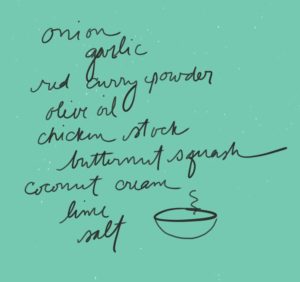 There is something about having at least one ingredient prepped that makes me about 10x more likely to cook after a long day of work instead of looking at a list of unassembled ingredients and deciding to pop some popcorn for dinner (not that, um, I would EVER do that.) On Sunday I tossed a butternut squash in the Instant Pot treatment (one cup of salted water, six minutes on high with manual release) while I made dinner. I also cleaned and gave its seeds about an hour in the oven on 200 degrees to dry them out. And so, having given myself just that little bit of momentum, this Monday night meal came together nicely.
There is something about having at least one ingredient prepped that makes me about 10x more likely to cook after a long day of work instead of looking at a list of unassembled ingredients and deciding to pop some popcorn for dinner (not that, um, I would EVER do that.) On Sunday I tossed a butternut squash in the Instant Pot treatment (one cup of salted water, six minutes on high with manual release) while I made dinner. I also cleaned and gave its seeds about an hour in the oven on 200 degrees to dry them out. And so, having given myself just that little bit of momentum, this Monday night meal came together nicely. There is something about having at least one ingredient prepped that makes me about 10x more likely to cook after a long day of work instead of looking at a list of unassembled ingredients and deciding to pop some popcorn for dinner (not that, um, I would EVER do that.) On Sunday I tossed a butternut squash in the Instant Pot treatment (one cup of salted water, six minutes on high with manual release) while I made dinner. I also cleaned and gave its seeds about an hour in the oven on 200 degrees to dry them out. And so, having given myself just that little bit of momentum, this Monday night meal came together nicely.
There is something about having at least one ingredient prepped that makes me about 10x more likely to cook after a long day of work instead of looking at a list of unassembled ingredients and deciding to pop some popcorn for dinner (not that, um, I would EVER do that.) On Sunday I tossed a butternut squash in the Instant Pot treatment (one cup of salted water, six minutes on high with manual release) while I made dinner. I also cleaned and gave its seeds about an hour in the oven on 200 degrees to dry them out. And so, having given myself just that little bit of momentum, this Monday night meal came together nicely.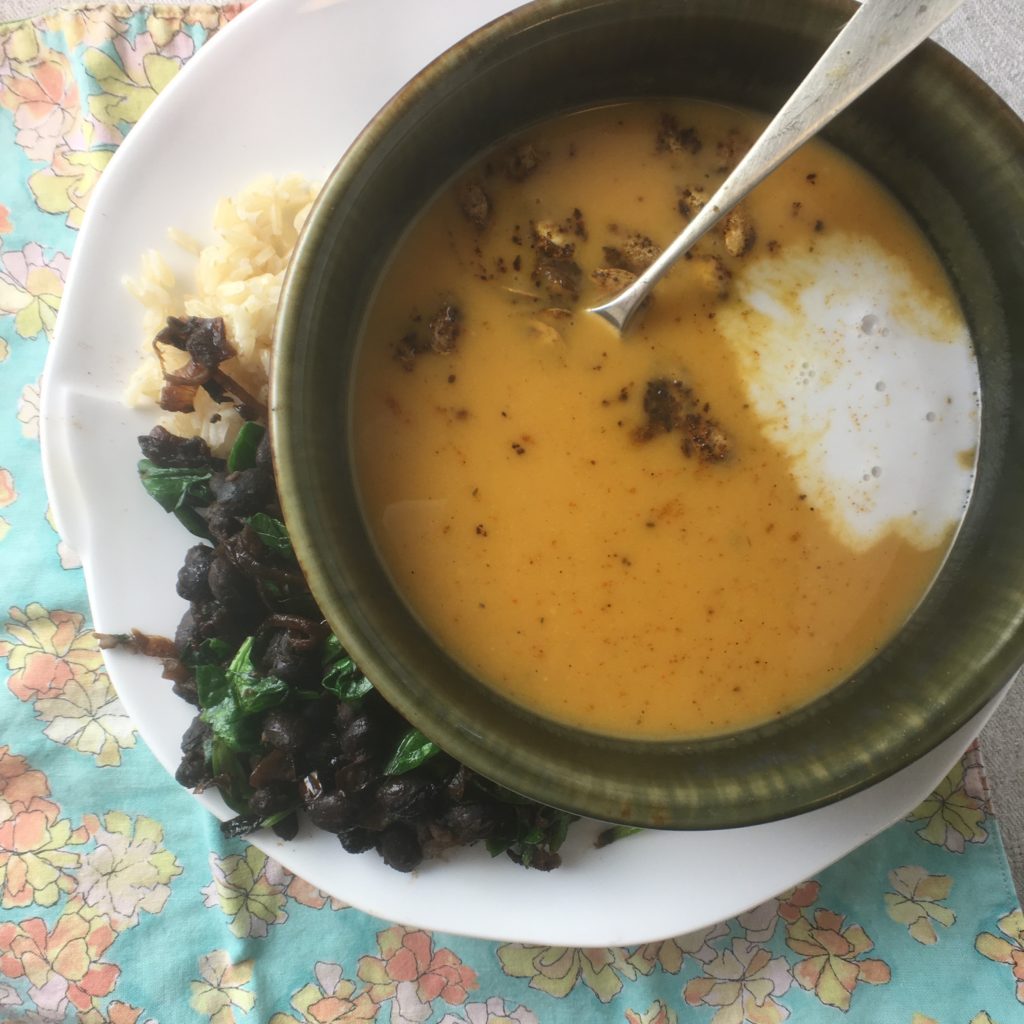


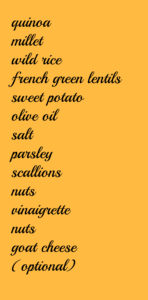 This is a great side dish for potlucks when you want to offer a healthier option than the usual chips and dip. Without the optional goat cheese it even qualifies as vegan (though if your friends are as carnivorous as mine I wouldn’t recommend announcing that as you arrive at the potluck). It holds up really well in the fridge for leftovers the following day or two, which helps make up for the fact that with all the cooking and cooling it does require plenty of plan-ahead time and multiple pots and pans.
This is a great side dish for potlucks when you want to offer a healthier option than the usual chips and dip. Without the optional goat cheese it even qualifies as vegan (though if your friends are as carnivorous as mine I wouldn’t recommend announcing that as you arrive at the potluck). It holds up really well in the fridge for leftovers the following day or two, which helps make up for the fact that with all the cooking and cooling it does require plenty of plan-ahead time and multiple pots and pans.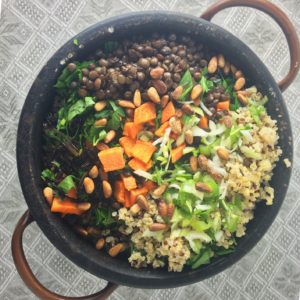
 I have a few general ‘food rules’ I try to follow, things I’ve found are pretty much guaranteed to make me feel healthy. One of those rules is to eat legumes in some form every day. I came to rely on legumes first because I found they were so good at helping to keep my blood sugar (and therefore my energy and mood) steady. But I don’t complain that they are also cheap, store easily, take spices and flavors beautifully, and introduce me to cuisines from all over the world.
I have a few general ‘food rules’ I try to follow, things I’ve found are pretty much guaranteed to make me feel healthy. One of those rules is to eat legumes in some form every day. I came to rely on legumes first because I found they were so good at helping to keep my blood sugar (and therefore my energy and mood) steady. But I don’t complain that they are also cheap, store easily, take spices and flavors beautifully, and introduce me to cuisines from all over the world.
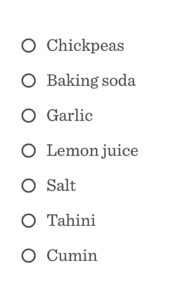 When it comes to either/or questions I try to remember first to question the question. Why should I choose one or the other? Form or function? Yes please. Republican or Democrat? No thank you. Healthy or tasty? Of course.
When it comes to either/or questions I try to remember first to question the question. Why should I choose one or the other? Form or function? Yes please. Republican or Democrat? No thank you. Healthy or tasty? Of course.